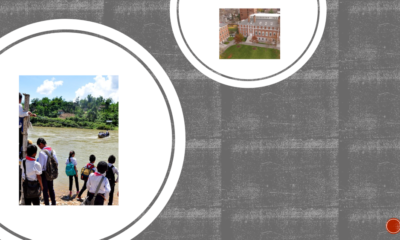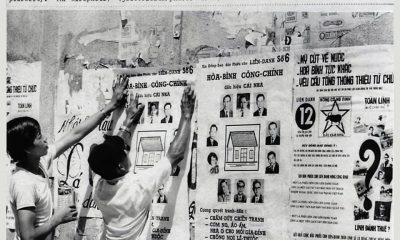Whither Vietnamese Catholic Communities in America? Catholic Youth and the Clash of Faith and Culture (Introduction, Part 1, Part 2, Part 3, Part 4, Part 5)
Part 1
Interviewee: Rev. Khôi Anh Đoàn (Seattle, WA)
5 June 2020
Anna Nguyễn
These interviews were conducted via Zoom and are published with only light editing for clarity. They are intended to supplement my initial research and provide a better understanding of different perspectives in regards to the sustainability of Vietnamese-American Catholicism.
Rev. Khôi Anh Đoàn is currently serving his convent in Washougal, Washington as an administrator. His previous parish assignments placed him in Portland, Oregon metropolitan area as well as dioceses in Dallas, Texas, and Seattle, Washington. Rev. Đoàn’s ministry has also encompassed that of a vocation director and chaplain for the Northwest Region of the Vietnamese Eucharistic Youth Movement, also known as Thiếu Nhi Thánh Thể.
AN: What are some challenges you have faced as a Vietnamese priest in America?
KD: I think the first challenge I faced as a colored priest – I’m not white – in a country that is majority white is that although they welcomed me, racism is still there. I believe that racism is still within the Catholic church, wherever you go. And this is a problem everywhere. Another challenge I think I faced was the youth. Because I worked a lot with the Vietnamese youth, I found that they were more Americanized. I tried to bring in more Vietnamese culture, more traditional things, and it seemed like they welcomed it at first. But then they lacked [interest] towards the end. This is very hard to talk about, since it is something that the first and second generation upheld for a long time. Now it is passed on to the third generation, and they are already influenced by the culture and language here, and all the other cultures as well. This country has brought in a lot of cultures from everywhere in the world, so just trying to keep and maintain the culture that we have upheld for years is a big challenge. And this is one of the reasons my community and I need to pass on traditions to the Vietnamese people all around the world, especially the U.S. There are more challenges but those are two main ones.
AN: What do you think are some challenges young Vietnamese-Americans face in the realm of Catholicism today?
KD: Yes, connected to the second question. Okay, the first challenge is not this generation’s fault. By being born and raised here, Vietnamese-Americans are influenced by what they learned and grew up with, That is challenging as well, but that’s normal. The second challenge is relativism. Relativism affects everyone, from young people to older generations. Especially for younger generations, relativism means that they follow whatever they believe in. They don’t hold on to the Catholic Church traditions that we older generations know. Jesus Christ passed it onto the Apostles; this is Holy Tradition. And whenever we talk about tradition, the youth are like ah, this is old fashioned. What is tradition? What is tradition in Catholicism? They don’t understand because they don’t get it clearly. The younger generations don’t have a good standard for everything that they choose. Whatever a lot of people do, they do. There are movements here and there, but whatever social media says, many of them follow to seek fame.
AN: Can I ask a follow up question to that? Can you think of any examples of relativism currently impacting our youth?
KD: Yes. When I discuss with young people, they bring up a lot of things from other traditions like Protestantism and Buddhism. They say: “Buddhists do this and Protestants do that, everybody does this so why not Catholics?” One example is homosexuality. Most of the countries in Europe and also America allow homosexuality. Most everybody accepts it, so why not Catholics? They don’t understand what marriage is. Who defines marriage? Not the society, not the government, but God himself. So I think that’s one of the examples I wanted to give you.
AN: Thank you. I’d like to segue into another topic and ask my next question. What can we do to resolve or at least mitigate the effects of these challenges young Vietnamese-Americans face?
KD: I think young people give themselves a chance to connect with the parish priests. Because of the lack of understanding and communication, because of language, because of culture, Vietnamese priests act differently from American priests. It looks like we Vietnamese priests are more conservative and held back than Americans. So it’s hard for you guys to approach and talk to us about things, and debate as well. If you dare to say something that opposes your priest, according to our culture, you dare to present your thoughts in front of older people. But in this country it is different. In this country, it’s a free country. You can present your thoughts, but you need to be taught by the authorities. The authorities are the people with the authority to teach in the Church, like bishops and priests.
So reach out. If you have a problem, if you disagree with the Catholic Church, come to the priest and present it to him. And let him handle it, let him answer it for you. Don’t try to look for answers that compare our Catholic Church with other traditions or denominations. Because if you try to compare with other denominations, how much do you understand the Catholic Church first? Because you don’t know the roots, you don’t know how deeply the Catholic Church is born and raised in our traditions, and you want to compare. This comparison is not legitimate, it is not fair. So try to understand our traditions, our Catholic Church, our faith within our faith. If you try to understand our faith without our perspective, then you see all the negatives. So my suggestion for generations like you is: come to your priests. Open up. Do not be afraid. All priests are nice. They love young people, they love the church.
AN: Yeah, that’s great to hear. It’s interesting that you say that, because as part of this younger generation, sometimes I feel intimidated by priests and other members of the clergy because they are very staunch in their beliefs. In my personal opinion, I think that it is something we shouldn’t be afraid of because regardless of what your beliefs are, if you are able to engage in respectful dialogue, you will be able to understand the other person’s beliefs better and move forward in terms of progress.
KD: I talked to a lot of young people at the college level, and they misunderstand the Church. They think the Church discriminates against homosexuals. No we don’t discriminate, we welcome everybody into the Church. Even sinners. Well, we’re all sinners. So all of us are welcome to the Church, but in terms of participating in certain things, it depends. And people who remarry without the Church, we don’t discriminate against them either. We welcome everyone. I know that you guys need to understand the Church more by exploring a dialogue, not by presumptions, because I don’t think that these are valid or legitimate presumptions.
AN: I just want to see what you think and challenge that by flipping the script. As priests, what do you think you can do to make the Church a more welcoming environment to individuals who you might not agree with, or may not align with the values of the Church, but still want to be involved?
KD: There are certain positions or things that people do, but invite them anyway. Let them do the work. And tell them strictly: you are children of God. And of course, we do not welcome sins. But we will welcome sinners. We do not accept sins, we hear God, but we accept sinners. Just come to God. and you know what you should do and what you should not do. Helping out with the Church is different than receiving Communion, because different sins prevent you from receiving Communion and the sacraments. So if you are in that category, you are not allowed to do certain things. Same thing in a society: if you commit certain sins, you are not allowed to participate until that is resolved. So, how do you resolve problems with these types of people? They know the sacraments. If your sacrament is invalid, you are allowed to get married to anyone in the church. [These people] don’t understand, they are afraid of those difficulties and answers to those questions because it takes too much time. We lack priests and need laypeople to step up and get degrees, since we lack professions in those areas. Without them, it takes longer. We priests are really sad to see you guys go to church and are not able to receive Holy Communion.
AN: Has Vietnamese Catholicism changed much in the past few decades?
KD: I would say yes. The first change is the vocations, since they were booming twenty, thirty years ago. But vocations are slowing down right now, I would say in the last decade or so.
Why? Because your generation was born and raised here, they don’t see vocation as something you want to dedicate your life to. Older generations like us, we came from Viet Nam, we were trained differently. We came here and the vocation is still in us. Viet Nam is a country that has Catholicism as a minority, I would say less than 6 percent. Priests and nuns who are religious are highly respected in society. Our parents taught us to dedicate our lives to our vocations, and we talk about this a lot. [Older Vietnamese generations] have more children than this generation, they have four, five, more than ten children. Your generation here have very small families, with two, three children max. Sacrificing one child for the call to priesthood or religious life is not quite easy. A family has only one child, and you ask that family to give up their only child to become a priest, to become a nun. That’s a challenge, that’s a big change.
I think that for the last few years, young people don’t go to church as much as the previous decades like twenty or thirty years ago. Now they are striving and trying to get away from the Vietnamese community. They look for the church or community that they understand better, one that talks in English. They are looking for mass that is shorter in the language they understand, so they don’t have to get involved much in activities in the church. Because in the Vietnamese church, you have to go to Vietnamese class, catechism class, TNTT, and all other kinds of things. So they keep it a minimum.
AN: So would you say that it’s more a commitment issue then? For younger generations?
KD: Yes.
AN: How do you envision the Vietnamese Catholic community within the next 50 years?
KD: Within the next twenty years and more, I would say that the Vietnamese churches all throughout the country will not see the language anymore. The Vietnamese language will be very minimal. People who go to those churches may not be purely Vietnamese anymore. Because you will get married to other ethnic groups, it has to be multi-cultures and languages. I don’t see events like Tet Trung Thu, New Year’s events in 50 years. Maybe it is just a world Lunar New Year. All new traditions. I don’t think you will be seeing these current traditions again within those 50 years.
AN: Wow. That’s quite a feat to think about. A very provocative argument.
KD: Yeah. Just thinking about 50 years, your parents will grow old and you will grow up. Will you bring your children to the Vietnamese church? If you do, that’s a plus, but most of you guys will say nuh uh. Or you will bring them there to have them learn more Vietnamese, because the American church still teaches your kids catechism. So only those people who still want to learn Vietnamese culture and Vietnamese language will go to a Vietnamese church.
In order to maintain what we have right now, first get married to a Vietnamese guy or Vietnamese girl. And, tell young people no matter what, no matter whom you get married to, I am Vietnamese, so my children will be half and half. Let my half transfer to my children, at least the language, the food. Let it be that culture that I know, let me transfer, let me pass down that half, and you pass your half to them. So they will have both. That will help keep our culture, our Catholicism, and all kinds of things to be alive. And to be sustained as well.
AN: So if I’m interpreting your words correctly: you’re imagining a decline in the Vietnamese congregation because of a progressive dissociation from the Vietnamese culture. Do you see any potential in a pivot so that there’s a chance for more engagement with the Vietnamese Catholic family in the future?
KD: You need a good leader. You need a good pastor; I’m talking about your priest. Your priest changes every six years, so, if you have a good leader in the next twenty years, then your community is still alive. If they focus on young people, on youths, then your community is still alive. Because in the next twenty years, people in the Church are not your parents, not your grandparents, but you guys. And then the next generation. So who will help them understand that going to Vietnamese church is better for you? Practically going to American church and going to Vietnamese church, which has more benefit for me and my family? Going to American church is shorter, you don’t have to worry about the language, you don’t have to worry about the gossip. You know, we’re Vietnamese, we say let’s go to American church. But one day you’ll realize you miss the Vietnamese church, the community that gave you the faith. So with that, I encourage you, as part of TNTT, to ask pastors to let you participate more.

 Politics & Economy3 years ago
Politics & Economy3 years ago
 Society & Culture4 years ago
Society & Culture4 years ago
 ARCHIVES4 years ago
ARCHIVES4 years ago
 Politics & Economy3 years ago
Politics & Economy3 years ago
 Politics & Economy4 years ago
Politics & Economy4 years ago
 Politics & Economy3 years ago
Politics & Economy3 years ago
 Politics & Economy4 years ago
Politics & Economy4 years ago
 ARCHIVES3 years ago
ARCHIVES3 years ago





